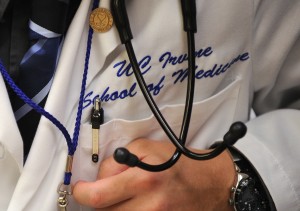Sign up for my FREE parent tips email and get my FREE Ebook on college financing!
 For those who have a passion for helping others recover from injuries and sickness, a career as a doctor can be one of the most fulfilling and rewarding, as well as lucrative, available. This does not mean, however, that becoming a doctor is easy: as little as six years and as much as ten may be necessary before you can provide a single patient with care independently. Here are some tips to get over the first hurdle: getting into medical school itself.
For those who have a passion for helping others recover from injuries and sickness, a career as a doctor can be one of the most fulfilling and rewarding, as well as lucrative, available. This does not mean, however, that becoming a doctor is easy: as little as six years and as much as ten may be necessary before you can provide a single patient with care independently. Here are some tips to get over the first hurdle: getting into medical school itself.
High School Preparation
Not many high school students may know what career they want to pursue, but for those who are interested in medicine, early preparation will help. When in high school, spend time thinking about what universities you could get into that would best prepare you due to strong coursework and good reputations. Ask advisers about universities that have strong medical school placement rates. Look for scholarships to help pay your way through university, so that you spend less time worrying about paying tuition or working to support yourself.
Apply Yourself In Undergrad
A doctor needs to have many skills, but above all else they need to be very good at remembering information. Medical school, after all, can be summarized as instructors teaching students the entire book of human anatomy and known diseases. Thousands of different bits of knowledge need to be committed to memory, so students should begin to work on their study skills once they enter into college. Show medical school applicant reviewers that your time in a four-year university was well spent by doing your best to succeed in courses. Pursue a life science degree, such as biology or biochemistry, which will give you prerequisite knowledge for understanding what health and life really means, right down to the cellular level. You do not need a 4.0, but few medical schools will take applicants that do not get better than a B average.
Prepare For The MCAT
To get into college, you take the SAT; to get into med school you take the MCAT. This standardized test challenges students on their understanding of biological science, their verbal reasoning, their logic skills, and their cognitive skills. Begin to prepare at least six months in advance to take the MCAT, since it will likely be more difficult than any other test you have ever taken in your life. There are many ways to prepare. Standardized test companies offer preparation courses that run for eight weeks and have comprehensive overviews and practice tests. They will be expensive — usually around one thousand dollars — but can be worth every penny if you prefer to prepare in a classroom environment. If you prefer to study on your own, these companies sell guide books that help you understand basics.
Enrolling in medical school can prove to be a hassle as one has to undergo a series of grueling exams which will determine if the candidate can pass to the final interview. Medical school interview preparation is paramount when it comes to getting accepted.
Have Back-Up Plans
Not everyone can get into Harvard medical school. If you feel like your application to med school is not strong enough to give you certain entry, think about alternatives. Overseas medical schools, such as those in the Caribbean, cater to students who have difficulty getting into American universities. These schools have the same coursework and teach the same medicine, but their lower reputation can make it more difficult to find a job upon graduation. If you decide that a foreign medical school is your best option, you will have to study very hard for the testing phases, called Step 1 and Step 2, in order to show that you are worth your stuff. Those who do well on these tests, however, have a very good chance of finding employment as physicians, surgeons, and psychologists once they finish their coursework and graduate.
____________________
Author Bio
Sarah Daren is a writer who creates informative articles relating to the field of health. In this article, she offers tips to students wishing to enter medical school and aims to encourage further study through colleges offering radiology degrees.
